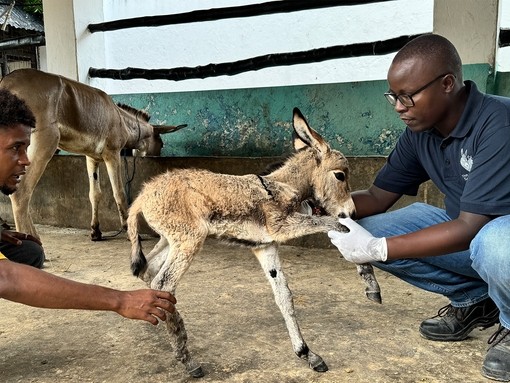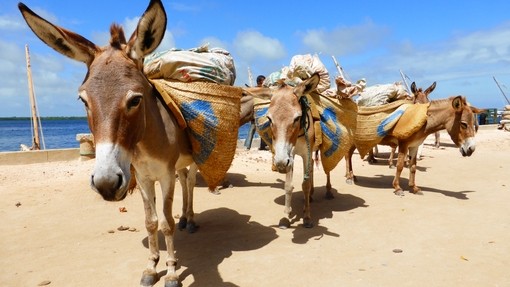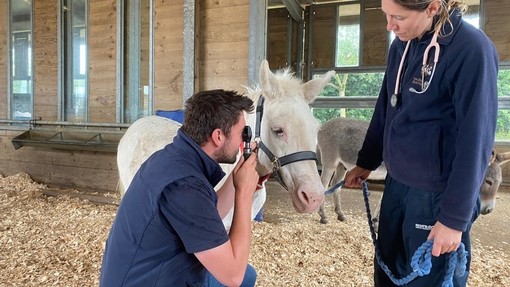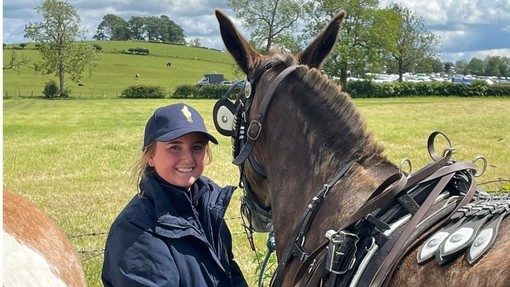
World Veterinary Day 2024
Our Lamu clinic opened over 30 years ago with a mission to improve the health and welfare of the island’s donkeys, who are such an integral part of life for the communities living there. The mission remains the same today.
Obadiah qualified as a vet from the University of Nairobi in 2015 and completed a Master’s degree at The University of Edinburgh in the UK, before going on to work with a range of dairy and companion animals.
It was when volunteering at the Kenya Society for the Protection and Care of Animals (KSPCA) that Obadiah first heard about The Donkey Sanctuary.
Joining The Donkey Sanctuary Kenya in 2022, Obadiah now provides vital health care and advice to Lamu’s resident donkeys and their owners at the island’s clinic.
Improving the lives of the donkeys on Lamu
Donkeys are integral to life on Lamu, where they make a valuable contribution to the local economy. Without motorised vehicles, communities rely heavily on donkeys to transport goods and people.
Improving the lives of the donkeys on Lamu by ensuring they have access to healthcare and by providing welfare advice to their owners, is at the heart of Obadiah’s work.
The huge reliance on donkeys within Lamu and surrounding islands means that Obadiah and the clinic play an invaluable and essential healthcare role within the community for both the donkeys and their human co-workers, who, without the support of donkeys, would struggle to carry their heavy loads.
Reflecting on his role, Obadiah says: “Lamu donkeys need our help and veterinary expertise. It is a privilege to fulfil my role as an essential health worker for these invaluable and resilient animals.”

A day in the life at the Lamu clinic
Situated in the picturesque Lamu Old Town, The Donkey Sanctuary Kenya’s clinic serves as both a veterinary clinic and an office for the charity’s Lamu programme. The clinic is involved in a wide variety of projects focusing on improving the health and welfare of donkeys in Lamu and the surrounding islands.
Obadiah describes what he enjoys most about working here: “No two days are the same at the clinic, which can be challenging but rewarding.”
Obadiah’s role in providing donkey primary care involves round-the-clock care and managing injuries and illnesses for his donkey patients.
On a typical day, he encounters a wide range of ailments, including donkeys with wounds from poor harnessing techniques or donkeys with infectious diseases. He also responds to clinical emergencies, such as bone fractures, colic and dystocia (donkeys having difficulty foaling).
Obadiah was recently called to help a donkey in labour and was greeted by not one, but two lively foals nestled by their mother’s side. Twins!
Twinning in donkeys is a rarity, often stirring excitement but also a concern as their chances of survival is slim – usually, less than 15 per cent will both survive.
Despite the odds, the twin foals survived and thrived, bringing immense joy to Obadiah and Ahmed, their dedicated owner.

Community outreach and advocacy
Another vital part of Obadiah’s role is the clinic’s outreach project, which engages in education and disease prevention through vaccination campaigns, deworming, farriery and dentistry work.
Obadiah says: “Besides treating donkeys, I am also involved in community engagement – either one-to-one with donkey owners during the treatment of their sick donkey or through forums and meetings to advocate for donkey welfare.”
Educating Lamu’s donkey owners is just one preventive measure to help ensure the health and wellbeing of the community’s donkeys. Obadiah and his team also work closely with the county government of Lamu to develop animal welfare laws.
He says: “The Donkey Sanctuary Kenya works closely with local government, for example collaborating on annual vaccination programmes to protect against rabies and tetanus in donkeys.”
These grassroots approaches are invaluable in helping to improve donkeys’ health and wellbeing.
As essential health workers supporting donkeys, veterinarians also support the wellbeing of owners who rely on them – a reminder of the powerful animal-human bond that benefits all.
As Obadiah says: “Having interacted so closely with these precious, resilient animals and seeing the issues they are facing, I keep asking myself, if we don’t continue to advocate for their welfare, then who will?”
Find out more about our donkey-facing teams
Share this page
Tags
- Blog




